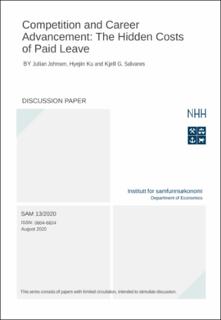| dc.contributor.author | Johnsen, Julian | |
| dc.contributor.author | Ku, Hyejin | |
| dc.contributor.author | Salvanes, Kjell Gunnar | |
| dc.date.accessioned | 2020-08-11T11:39:03Z | |
| dc.date.available | 2020-08-11T11:39:03Z | |
| dc.date.issued | 2020 | |
| dc.identifier.issn | 0804-6824 | |
| dc.identifier.uri | https://hdl.handle.net/11250/2671485 | |
| dc.description.abstract | Does leave-taking matter for young workers’ careers? If so, why? We propose the competition effect—relative leave status of workers affecting their relative standing inside the firm—as a new explanation. Exploiting a policy reform that exogenously assigned four-week paid paternity leave to some new fathers, we find evidence consistent with the competition effect: A worker enjoys a better post-child earnings trajectory when a larger share of his colleagues take leave because of the policy. In contrast, we find no direct earnings effect resulting from the worker’s own leave when controlling for their relative leave eligibility status within the firm. | en_US |
| dc.language.iso | eng | en_US |
| dc.relation.ispartofseries | DP SAM;13/2020 | |
| dc.subject | leave of absence, career interruptions, ranking, tournament, promotion, gender gap | en_US |
| dc.title | Competition and Career Advancement: The Hidden Costs of Paid Leave | en_US |
| dc.type | Working paper | en_US |
| dc.subject.nsi | Samfunnsvitenskap | en_US |
| dc.source.pagenumber | 48 | en_US |
| dc.relation.project | 262675 | en_US |
